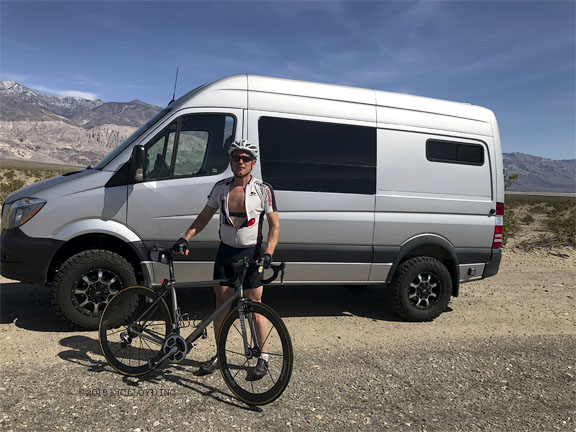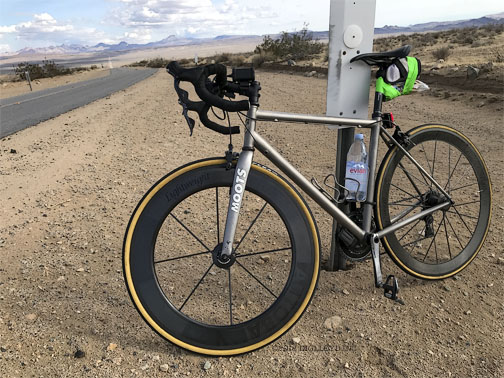Experience Report: Concussion (“Moderate to Severe”) aka Mild Traumatic Brain Injury via a Short Flight at 25 mph into Embankment from Bike
April 10, 2018: my recovery is going well or so it feels, slower than I’d like but each day a little better. I am walking not running, so to speak.
For the present I am content to accept what is given me, doing a few things each day and being satisfied with that, e.g., a short bike ride, a nap or two daily, waking when it feels right and sleeping when it feels like time, a little driving, and meandering in my van through Arizona and soon into Utah. I am in no hurry to return home where it is only less restful (I can never escape background noise, for example): my goal is to heal myself. Fortunately, my Mercedes Sprinter photography adventure van places no limits on comfortably sleeping, eating or working.
I have been making images every other day or so, collecting that work to publish sometime soon when I feel I can sustain a 4 hour computer effort without strain.
As a first effort at computer work, I have organized and added to the subject most important to me at present—getting back to full health. Indeed my goal is to take some newly learned lessons and not only recover, but improve in various areas. I will not resign myself to any limitation until I have tried everything possible. I’m obstinate that way before or after The Crash; I tried to think of anything I’d ever quit for a few weeks now, and I could not. I am not going to quit on this one.
This post is now reorganized and expanded into multiple pages at WindInMyFace.com, so NO FURTHER UPDATES HERE.
See Concussion Recovery Phase 2 and later pages for daily comments/journal. Phase 3 will begin when in my estimation I can work 4+ steady hours at the computer and ride 5 hours on my bike and feel normal. Then I will go after weak areas, should they linger.
Lloyd’s Mild Traumatic Brain Injury (mTBI) Experience and Recovery Process
Mark writes:
I must confess that when I saw you begin to chronicle your injury and recovery “experience”, I was not sure how you were going to hold your readers to such a personal, private issue. After having had the benefit of reviewing your quite public introspection and thinking on the many sensations you endured/felt/lived, I wish to commend you for this rather distinct body of work. Surely neither you nor I (please allow my use of “I" to serve as the “We” of your readership) ever thought we would be engaged in considering such a critical medical issue on our favorite photographic site. [content since expanded and moved to onto WindInMyFace.com]
I often take inspiration, not just from the finely honed technical analysis you afford us, but also from the Art you create and then analyze. To take the torn fabric and Art of one’s life, particularly a traumatic injury and then subject your recovery approach from same to a similar level of scrutiny affords all of us an opportunity to take hope that should a proportional challenge befall us, we too might find wellness.
Clearly, given the depths to which you have gone to afford us insights into this recovery from a severe concussion, you have remained, throughout, true unto thy self. Some might not (yet) appreciate or value such participant observer, clinical musings. As events would have it , the pen in your hands- absent a lens, have revealed much: the Content of Your Character.
May your recovery prove to be solid and vibrantly sustainable. Much respect for your efforts. I have no doubt that many will benefit from considering your experience and fortitude. M
........................Original post below ..............................
Negligent road maintenance—a deep pothole—masked by a shadow is all it takes. Had I had a larger rear tire, I suspect the bike would not have thrown me—a new bike frame arrives soon, and it will accommodate a larger rear tire. But that’s all speculation now.
For serious cyclists: Thoughts on Recent Training, What I’ve Learned and What Remains to Learn.
Below, in reverse chronological order (newest first).
Thank you to supportive readers, and especially my loyal subscribers. The latter are critically important to me as I recover, and I am grateful to them. I also want to thank OWC / MacSales.com and B&H Photo for their ongoing support as I work through this.
Crash was on March 17; I went to the ER but I was not even evaluated for brain injury in spite of telling the attending physician that I had crashed hard into an embankment at 25 mph as well as (in retrospect) having obvious concussive symptoms.
A short bike ride the evening of March 21 (just over 4 days later) sent me to the ER the next morning (March 22) with symptoms severe enough that I would not have been able to drive myself there (my wife drove me). It is my theory that the initial injury was exacerbated by my activities following the crash, light as they were (I knew something was off and was not doing much).
Update April 9, 24 days after crash, 19 days after ER visit #2
This post is now reorganized into multiple pages at WindInMyFace.com, so NO FURTHER UPDATES HERE.
It is my intent to capture the experience with the simultaneous goal of tracking my progress and gaining insight into my recovery. By so doing, I help myself and, perhaps, help others who might suffer a similar setback. Since each case is unique, all I can do is relate what worked (or seems to have worked) for me.
As things progress, I will touch more upon nutrition, exercise, tDCS, and nootropic and other drugs that I have developed opinions on for my self. Note that in general, I would advise strongly against anything except highly nutritious diet to start, with mild exercise after the acute phase. It is my general feeling and attitude (not even doctors can say much) that prescription drugs have a good chance of doing more harm than good while the brain heals—there is no magic bullet, and many things might really be “bullets”.
- Concussion Recovery Phase 2 and later pages for daily comments/journal.
- Lloyd’s mTBI (Mild Traumatic Brain Injury) aka Concussion Experience and Recovery
Update April 8, 23 days after crash, 18 days after ER visit #2
[I added some more notes for April 7, below, something remarkable that I forgot to explain].
To bed at 8 PM last night, as the day was too much for me as noted in yesterday’s entry. I awoke with a slight headache and feeling of a pressurized head at 6:30 AM. I take that as a sign that the relatively easygoing day yesterday was still too much, even though the driving of 6+ hours was at low speeds on isolated dirt roads—the late day fatigue made me feel quite worn, as if I had carried a heavy pack for ten miles, but worse in that it was accompanied by feeling overtly stressed.
A 45 minute rest/nap @ 9 AM helped a lot to (mostly) clear my head.
Based on yesterday’s late-day experience, I am going to have to limit my driving and camp early. Clearly something about driving takes a toll on me. Yet that is actually rather tough; I always insist on a camp free of noise other than natural ones as I find that most restful.
I woke at 6:30 AM today (well, at 01:30 and 03:30 also), and at 6:30 there was gorgeous morning light with a dark stormy background, so I roused myself and got some nice waterfowl shots at Pintail Lake near Show Low AZ. It was worth it, but my 9 AM nap and a later one were needed. I will be publishing those shots in my review of the Panasonic 200mm f/2.8.
Today I did a one-hour hard workout (about 240 watts average X 3 repeats, 230W to 310W range) at an elevation of 7500 feet. My lungs were free and clear, and working to capacity to keep that effort nearly aerobic with a large volume of air moving in/out*. Still, while the workout felt good, I have a sense that riding much more than an hour is going to take some time for the brain to catch up. A friend of mine who had a concussion last year told me that he just felt tired on the bike for a month. I don’t feel that at all for the first hour, but there are hints (not yet tested) that pushing towards 1.5 to 2 hours may be another matter.
* I have 125% of “normal” lung capacity, so when my small airways work without bronchospasms, I have a very high VO2 MAX; at age 36 I tested in the 99.9th percentile for 18 year olds.
I camped a few miles down a dirt road on the Mogollon Rim, just short of Clint’s Well AZ. The elevation of 7900 feet is much higher than I would have preferred, but by now I seem to have acclimatized well after 9 days of steadily increasing altitude*, so it seems not to be a problem, even if it is not optimal. Still, the workout and the altitude made me very tired and I napped/rested an hour after some feeble but useful shooting for half an hour. The demand for rest felt urgent, but I recovered to a reasonable state by 7 PM. Now to bed at 20:40.
* Acclimatization: 24-36 hours after going to altitude, the spleen releases extra red blood cells (aka “spleen dump”) and the body sheds considerable water (blood volume) at the same time, along with adjusting electrolyte balance. At 9 days, the bone arrow releases more red blood cells, brought to ripeness by the stimulation of altitude (albeit having gestated for 3 months). These behaviors are what I counted on each year for the Everest Challenge—natural blood doping by hypoxia.
Update April 7, 22 days after crash, 17 days after ER visit #2
To bed just after 9 PM, sleep eluded me for 2+ hours, which has been a common event. Still, I slept soundly until 7 AM., though I rested in a half-sleep state for an hour or so. Striking to me is the relatively minimal dreaming (at least that I remember), versus the prolonged, varied, and vivid dreams up to 10 days after the crash. Whatever regulation mechanism there is for dreaming, it seems that a concussion loosens up and lubricates whatever mechanism engages/encourages dreaming, even (in my case) nearly all the night right until awakening (through day post-crash day 9, at least). Whether that dreaming is in REM state or not I cannot be sure, but I think so. This I think might be one good clue to the phase of recovery (vivid and prolonged dreaming).
A bonus even with my contact lenses out: parked off the main road on a nice private dirt road, the crickets chirped happily while the stars blazed bright (blurred as they were without contacts!) while a mild breeze yielded pleasant ventilation around 70°F to start, dropping to 52°F at the coldest—quite a wonderfully perfect night and one of those small things to be thankful for. If you have not been outdoors like that, you’re missing something in life that costs nothing, but cheers the heart.
I took a leisurely morning today, stepping out of the van and riding away for a nice 45 minute ride in the Gila National Forest on SR114 with about 2000 vertical feet / 610m of climbing from ~6000 to ~8000 feet elevation. There are many nice smaller roads with near-zero traffic, even on Saturday, and I highly recommend these backroads. SR180 is very nice south of the City of Alpine, NM, as is Arizona SR249 out of Alpine, AZ. The temperature was wonderfully pleasant in the 6000-8000 foot range throughout the area. As with prior days, I felt terrific during and after the ride. My feeling is that if a wholesome activity feels good, it probably means something good.
I felt the need for only a modest short nap that day (30 minutes or so), and that was just rest, not sleep. Maybe the next point speaks to another kind of rest.
After the ride and to early afternoon, I had a magical experience: I felt a sense of joy and contentment, almost uncanny, but very present and very real. This lasted about 3-4 hours and I have no explanation—was it the bike ride along with the perfect conditions and/or was it the flip side of the coin of emotional swings possible with a concussion? I cannot say, but the swing at most was from neutral to high—0 to 10 so to speak, but 0 to 10 to -10. It would be useful to initiate and harness that kind of mental state, and maybe I can learn how, sometime, just as I seem to have learned to make small pains vaporize in short order (see March 29 entry).
The foregoing episode as well as the new skill of pain suppression now makes me wonder if those two things have been latent, and that somehow repairing the injury is in the process making new neural connections, or strengthening latent ones. That is how it seems to me. I might have inadvertently played a part by my attempts each day to consciously rest my mind and to quell my thoughts. Maybe that is meditation of a sort, but I do not know as I have never learned it.
While remaining my own whole, I have watched myself as an observer even as I interact with others, and the world (to use a computer analogy: 2 CPU cores are active at once). I was acutely aware of this simultaneous and parallel operation when I arrived at my father’s place: I observed just how degraded my speed of thought was that evening, a sort of quiet running commentary on my own thoughts and speech. It’s hard to describe perfectly, but there it is. Maybe it is a curious kind of mindfulness (again, something I have no experience with, only a sense of what it might entail).
And so it was a good day through 3 PM or so, but by mid-afternoon I was tiring, having driven up to 9000' elevation and taken a wrong turn on a remote dirt road. The bonus was seeing a herd of bighorn sheep, a herd of elk, and several herds of wild horses. I should have just camped overnight up there, but I wanted to get back to pavement which proved a mistake, as I ran into a corridor of strip-mall like crap for mile after mile near Pinetop Arizona, which kept me driving until sunset. By then (and previous two hours), I was toast; I could feel the fatigue like a lead vest weighing me down. Note to self: drive no more than 4 hours per day, and camp early and rest.
Update April 6, 21 days after crash, 16 days after ER visit #2
Slept soundly again, albeit taking 3+ hours to drop off (9 PM to bed, past midnight sleep). And et when waking at 6 AM, my head was clear and I felt good.
I departed my father’s place around 10:30 AM and went shopping for supplies for the 1500 mile trip back. Same store (Sprouts), similar experience though less pronounced: moderately loud and disparate noises inside the store made me feel spaced out and inattentive, but as with the April 4 episode, this passed quickly after exiting. So there is something to the idea that ambient noise is a serious stressor when recovering from a brain injury at least for me.
How a city dweller or worker in a noisy office could manage this while recovering I don’t know, and it repudiates the idiotic but popular anthill “open workplace” (one big echo chamber for dozens of people) that is so trendy today—seems to me that the level of knowledge about the human mind performance is just about nil when it comes to environmental factors, that is, among the trendy types in Silicon Valley. Moderate or high ambient noise is a stressor to many if not all people, concussion or not, as I recall from reading in a scientific study some time back. My concussion has only brought home to me this already-known fact, but laid bare just how nasty the effects are to an already stressed mind (which in modern times is most of the population).
While driving, I wore my Sony noise canceling headphones while driving—these things are amazing: use the sound optimizer and nearly all the wind noise and road rumble disappears; all I hear is a faint hiss and the random but muted other noises. Take 'em off and OMG: the volume seems incredibly loud—there is quite an auditory onslaught while driving at 70 mph. One test of auditory stress is to focus on an audio book while driving—I found this possible but unenjoyable as it required effort.
The night’s 6 hours of sleep apparently caught up with me: 2 hours and 120 miles into the drive, I felt very sleepy. Thinking I would be 'good' with a 30 minute nap, I lay down, quickly sank into a very pleasant half-dream state, and woke up 3 hours later! I have to say that I love the ability to pull over and rest in my Mercedes Sprinter photography adventure van when needed in my comfortable-as-home bed whenever I like.
Anyone with an SUV who likes to travel as I do should think hard about what is the point of an SUV, when none of them have a fraction of the comfort or convenience, and yet my 4x4 Sprinter offers far superior clearance to virtually all the SUVs on the market. I’ll never even consider an SUV again; what a PITA for travel. I am not talking about a full-on sewage-on-board RV Sprinter, but any empty box Sprinter cargo van with a bed, a big Yeti cooler, storage boxes and a table; see Mercedes Sprinter: Bed Platform, Bike Storage, Layout Design. Since the Sprinter costs about the same as any medium-price SUV, it’s a no-brainer IMO. And the Sprinter promises 250,000 miles or more with its long-lasting diesel engine and minimal electronic yuck.
After 5 days of very positive post-ride feel, I am concluding that exercise (cycling for me) has a strongly positive influence on my concussion recovery. Each and every time I have ridden, any brain fog or feeling of tiredness vaporizes, leaving me feeling energized and refreshed when done. Including being able to listen to an audiobook while driving, which I noted as being unenjoyable prior to riding. Going forward, I am thinking that twice-daily rides (each reduced in duration) might be just the ticket to taking advantage of this finding. My thinking for years now has been that the hugely increased blood flow of vigorous exercise benefits all aspects of health including of course the brain. Now, more than ever, I am not just persuaded but convinced of the validity of that theory. Which science is only now beginning to probe (see March 28 entry for more).
A bonus even with my contact lenses out: parked off the main road on a nice private dirt road, the crickets chirped happily while the stars blazed bright (blurred as they were without contacts!) while a mild breeze yielded pleasant ventilation around 70°F to start, dropping to 52°F at the coldest—quite a wonderfully perfect night and one of those small things to be thankful for. If you have not been outdoors like that, you’re missing something in life that costs nothing, but cheers the heart.
Update April 5, 20 days after crash, 15 days after ER visit #2
4:30 AM: Slept soundly from 9 PM to 4:00 AM, and felt good upon waking, but wish I could have had 3 hours more sleep! Still, as with yesterday’s limited sleep, my head is clear. I am normally an 8-9 hour guy for sleep needs, so 6 or 7 hours leaves me well short of my usual requirements. I don’t know what to do about the sleep issue and I am reluctant to use any sleep aid (ambien or diazepam or similar), as these all work on the brain.
Today I will do an easy ride (yesterday’s was high intensity) and see if I continue to have excellent results on the bike. All evidence to date supports the idea that my brain injury has affected certain aspects of function strongly, but not neuromuscular aspects. Thus cycling is easy, but working at a computer or attending to other cognitive tasks more than 90 minutes is fatiguing. I sense no deficit in analytical processing, only a stamina issue. I would make the analogy of driving to the same place, but as the drive goes on, the hill steepens, and speed drops steadily to 50 mph instead of 75 mph.
Update (late): today was my best day so far: mentally sharp all day, no issues, felt good, almost no headache, still some fatigue but it might just be the 4 AM wakeup this morning. Tomorrow I head towards home (~1400 miles); I intend to limit mileage to at most 250 miles a day and to incorporate a ride and some photographic shooting each day on the way back. I have actually already shot some material but I have held off on the visually and mentally demanding evaluation / processing / publishing phase, which means hours of work at the computer.
I now start to think of the less important but annoying things: weighing in at 176 pounds instead of my scheduled 171 pounds—this matters a ton for double centuries with a lot of climbing.
Update April 4, 19 days after crash, 15 days after 2nd ER visit
Went to bed last night at 9 PM but tossed and turned until 1 AM, sleeping not, thought it was restful. And yet in spite of the sleep problem, this morning my head was clear and I felt better today than I had in 3 days.
I now have this working theory that the injury to my brain has (as far as I can tell) left neuromuscular functions unimpaired. I say this because I can detect no loss of power or coordination (smoothness and speed of pedal stroke, bike handling, etc), and that assessment is based on a decade of hard core cycling as well as this year’s extensive training. And yet this co-exists with improving but still impaired cognitive stamina which at its best is perhaps 90 minutes of concentration, a bit less or a bit more, depending. It’s not a dropoff of attention per se (no nodding off) so much as an increasing feel of the need to close my eyes and rest my head, so to speak.
Today was a hard cycling test: 88 minutes at the maximum power I could sustain just short of developing lactic acid “burn” in the muscles, at an altitude of 4000' (I am/was not fully acclimated as yet, which is unusual, but there is partial acclimatization). My lungs were working to their full capacity, and I wore an N100 dust mask due to a pall of airborne brown dust in the Las Cruces, NM area (this kept my lungs clear and no bronchospasms). Result: outstanding power, absolutely no loss of mental attention—I felt great during and after. I have this theory that 80000 miles or riding over a decade have resulted in developing a highly efficient area of my brain tuned for efficiency. My feeling is that the primary mental demands are visual processing of a rapidly changing road surface and environs, with everything else operating semi-autonomously (yet under conscious control).
Today I had a curious “episode” about an hour after the ride, though given how good I felt during and after, I do not associate it with the ride. That is: while in a supermarket with a relatively high noise level, my ability to attend to my surroundings dropped markedly. I found it it challenging to decide which checkout line to choose and being more or less oblivious to my gesturing father urging me towards another checkout line. Stepping outside after checkout, the whole thing rapidly began to clear and disappeared within 2 minutes—I felt the change immediately upon exiting. The only factor I can associate with the episode was a high ambient noise level.
I now have this working theory that high ambient noise levels take a heavy toll on my brain. I have always been very sensitive to noise my whole life (particularly when already stressed by other factors), so a brain injury could very well make high noise an “overload” issue very quickly. This would explain the noisy supermarket episode as well as why the 4-5 hours of driving pushed me back into mental fatigue for two days: at 65-75 mph on mediocre to shamefully bad pavement, there is a constant wind noise plus pavement rumble along with assorted squeaks and rattles—we tend to tune this out, but try attending to the ambient sound while driving on rough pavement; it is quite a high noise level. A Mercedes Sprinter is no heavily sound-damped Porsche or Mercedes sedan! I will be driving the freeway home (1300 miles, taking my time, stopping any time I feel like napping) soon using my Sony noise canceling headphones, which work great. They take out 95% of the ambient noise, which if my theory is correct, should help tremendously.
Update April 3, 18 days after crash
Thanks again to well wishers. I’m eager to get back to work, but today’s blog post over at WindInMyFace.com was enough (an hour), and it did not demand assessing images, which is much more visually demanding, even pre-concussion.
I’m still suffering from the 600 mile drive yesterday; my head is not clear. I slept well last night and napped today, but a good kick in the shins is good for me I guess e.g., a reminder that long days like that should be avoided for some time to come. The thing is, I feel physically very strong, with my legs spoiling for a thrashing (hard workout) which makes it a weird combination of physical impatience while the brain clearly needs more time for cognitive tasks.
I felt great on March 30 and April 1 and nearly so April 2 (and at 6200' elevation), so I find it hard to blame a short bike ride for yesterday and today’s mental “fog”. The driving I think is much more demanding than riding my bike, requiring more mental effort. I guess it drained me (April 2 600 mile drive).
Sleep continues to be problem: I can’t seem to fall asleep until 11:30 PM, which has repercussions for being rested in the morning. Today’s 2 PM nap definitely was the right thing to do.
Today I did a very short (23 minutes) but very high intensity workout: sustained output of nearly 500 watts (that’s a lot) for 30 seconds and several other similar efforts for 1-3 minutes (but at 380 watts or so). That effort seemed to clear my head better than anything all day, so now I have this curious situation in which (maybe) increasing the exercise might somehow clear out the brain fog. TBD with a morning ride tomorrow.
Below, instead of weighing in at my planned 171 pounds, I’m up to 176, not having restricted my calories for 3 weeks. For my first post-concussion ride, I relied upon my sense of well being so I went ahead: it was 90°F with a rough road (I lowered the tire pressure) and a stiff headwind and I put out ~240 watts for 45 minutes and felt great, noticing no ill effects at all even 24 hours later. I was able to spin smoothly in the 98 to 103 rpm range, so clearly the neurophysiological firing is working well for exercise—I could not detect any degraded coordination in that regard.

iPhone 7 Plus + lensNA @ 4mm
[low-res image for bot]
Update April 2, 17 days after crash
I gained a lot of strength back over the past 4 days, in spite of some not very restful days (driving long distances). Altitude has not bothered me up to a mile high other than inciting some tiredness, but that is true even pre-concussion (I had to sleep at 5280 feet elevation 3 days ago, unavoidable—no issue). Morning Resting Heart Rate (MRHR) still is ~7 beats higher (50) than it ought (43), and diastolic blood pressure often 20 points high, but I did get normal readings today (116/71, 120/72, 121/70) after several readings earlier in the day of 132/96 or so.
As with most things: 3 steps (days) forward, 1 step back, but only a small one I suspect and really only a rest issue I suspect. Yesterday’s 610 mile drive at too-high altitude (much of it 5000 - 7200 feet) took its toll both ways—it is quite demanding to drive at 65-75 mph. No harm done I think, but it wore me out in spite of my daughter driving more than half the distance, but we’ve arrived and I can now rest for 3-4 days.
I’ve done my cycling test 4 days in a row now (short ride each day). I have observed no negative issues that I can attribute to it. Indeed, over in the Panamints for the first ride, I did high wattage at 90°F at high rpm (98 to 105) for 45 minutes—just felt good and so did the next day. I did not / do not detect any negatives I can attribute to the ride. My heart while riding is tricky to assess; it might be ~5 beats higher than it ought, but the much higher temperatures make that a tough call. Everything feels fine and balance seems fine. Still, I doubt I could manage a 2 hour ride without overdoing it—demands on the brain add up—I’m not ready for even testing a short high speed twisty descent—that will need a few weeks to approach and only after I can ride 3 hours and notice no mental fatigue. I’m going to keep easing into it; the short rides are feel-good ones and for staving off loss of fitness (and weight gain!), but I’ll shoot for a 90 min ride in a few days if I feel well rested by then.
Now I am at my father’s place and should get 3 days of good sleep and rest whenever I need it.
I did get some shooting done on the way which I will publish once I feel I can work on the computer without strain for an hour or more. I’m waiting 3-5 more days to attempt it. Shooting (photographing) not very far from the car is both low risk (falling/tripping) and not very mentally demanding from what I can tell.
Update 29 March, 13 days after crash
Waking up at 4:40 AM to be at ADF Sprinters at 6 AM, driving through heavy high speed traffic into San Fernando definitely was not an easy thing for me (constant attention to everything around me, quite demanding), but I tolerated it, and rested later. Given that I could not fall asleep until 11:30 or so, that’s a sleep deficit that would have made it tricky pre-concussion also.
I tested myself on pain banishment last night. Maybe I never tried it and it is just nothing new and has been latent all along, or maybe the concussion is opening new neural circuits. What led me to the idea was yesterday’s thinking about neuroplasticity, in particular retraining the brain to eliminate chronic pain (achievable from what I read). I don’t have chronic pain of any kind, but I posited that the same idea might work for small things.
So I tried yesterday and today—anytime a headache or a small ache/pain arose, I made it go away through mental effort alone, a sort of visualization of massaging away the spot of discomfort. I was a little shocked to find that so far, every such attempt has succeeded, usually in 5-10 seconds. Whether I can succeed for serious pain like a nasty road rash—I’ll push that off until when it happens! But now I recall over the years having mastered a broken finger, shearing of muscle and fascia (sliding bike crash) and other things. They never caused me more than short-lived pain, and in retrospect I think that unconsciously I’ve already been developing the habit, though sometimes forgetting to use the skill.
Update 28 March, 12 days after crash
I am down in SoCal getting the table installed in my Sprinter van, along with a reference-grade state-of-the-art rewire for my 10 kw lithium iron phosphate battery system (the kind that won’t burn up like most lithium batteries do). The 47.5 gallon fuel tank rocks, and after filling it up from 8 to 47 gallons, the van rides better with the extra 320 pounds, which is down low so even the handling improves—you wouldn’t believe how good it drives with so much mass down low, as tall as it is. My daughter did a nice chunk of the driving, which helped a lot.
I am getting a little stronger each day and will soon start probing recovery with some (very short) bike rides to start, increasing effort and distance only when the prior day’s effort has no perceptible fatigue results. Already my tolerance for computer stuff has increased substantially, and I can tolerate much more than even just 3-4 days ago. But I still feel it hanging on me, so I keep reminding myself to take it easy—tomorrow I’ll rest a lot while the van is being worked on. I bought some Sony noise canceling headphones, which work great in many conditions,
Exercise vs aging
For some years I’ve commented now and again in the health articles of mine at WindInMyFace.com that I was certain that cycling has major positive effects on health, e.g., I can’t remember having any significant infection for years, and only a sniffle or two per year at most.
Technical paper: Properties of the vastus lateralis muscle in relation to age and physiological function in master cyclists aged 55–79 years
Indeed before this concussion, I was on track for the strongest double century performances of my life and I am now almost in my mid-50s—for the first two doubles this year, I outrode hundred or more other cyclists by a large margin, excepting a team of 3 working together who did not beat me by much. I had the Perfect Plan this year, I was way ahead of my already audacious goals, but all that was upset by one stinking pothole.
The New York Times in How Exercise Can Keep Aging Muscles and Immune Systems ‘Young’ comments on two aspects of health. See the entire article for a fascinating read that dovetails with my own self perceptions over some years about exercise and health. My father is 78 years old, and he still rides about 16-20 miles three days a week—most of his old friends are dead.
Remaining physically active as we grow older could help to keep our muscles and immune systems robust, according to two inspiring new studies of older recreational cyclists.
Together, the experiments add to growing evidence that some of our assumptions about aging may be outdated and we might have more control over the process than we think.
...For their inaugural study of the riders, which was published in 2014, the scientists measured a broad range of the cyclists’ physical and cognitive abilities and compared them to those of sedentary older people and much younger men and women. The cyclists proved to have reflexes, memories, balance and metabolic profiles that more closely resembled those of 30-year-olds than of the sedentary older group.
... older cyclists are not like most of the rest of us. They are healthier. They are, biologically, younger. Their muscles generally retained their size, fiber composition and other markers of good health across the decades, with those riders who covered the most mileage each month displaying the healthiest muscles, whatever their age.
The impacts on riders’ immune system also were marked. In the older sedentary people, the output of new T cells from the thymus glands was low. The inactive older peoples’ thymus glands also were atrophied, compared to those of the younger group. The aging cyclists, on the other hand, had almost as many new T cells in their blood as did the young people. Those who exercised also showed high levels of other immune cells that help to prevent autoimmune reactions and of a hormone that protects the thymus against shrinkage.
...
Update #2 27 March, 11 days after crash
One thing concerning me is that when I do return to cycling, it might to 6 months to a year to push down the fear response when going fast again—I experienced this as a teenager after a crash in the French Alps, though I don’t think I had a concussion then, as I slid nicely through rocks and weeds rather than an abrupt shock.
This is the first concussion in cycling that I know of (a few minor crashes here and there), and that I’ve done 80,000 miles in the past decade, and none of it slow. Of course I have to verify that I recover with my former mental response time and balance before resuming what had been routine high speed descents and similar.
Some readers have in effect questioned my judgment on wanting to cycle again at all. That would be a major psychological blow impacting me in negative ways—I’d probably have to fight off depression with a huge hole like that taken out of my life—it is something I greatly enjoy with no easy substitute. Plus I see it as an essential counterbalance (health and comfort) to many hours in front of a computer. Walking and running and swimming and weight lifting would either bore me to tears and/or damage my body (osteoporosis with swimming, cartilage loss with running) in relentless ways. My old favorite of speed skating would be fine, but that carries similar risks to cycling, and there is no good stretch of pavement nearby anymore. All my life I have not just desired but required intensive physical activity, which I know from experience ultimately provide the deep well of energy for all my mental activities. I can’t see anything but cycling fulfilling that need physiologically and in terms of time and cost and enjoyment.
Feeling better now at about 11:33 AM. I took a short nap bare-backed in the sun while I used me own form of meditation, briefly for just 10 minutes or so. And I’ve been able to use the computer for an hour or so now and no headache. But time to stop now, what I reflected on follows.
I think I am going to apply neuroplastic healing consciously, once I figure out the best approach. In fact, I realize that I have already been doing that meditation-like while half napping—and it seems to always refresh me.
Thank you to the reader who suggested The Brain’s Way of Healing by Norman Doidge, M.D. @AMAZON. I’ve just been skimming but so far I am dumbfounded in realizing that the little cycling tricks I’ve trained myself on for years seem to be precisely a form of neuroplastic learning.
Put another way, my huge gains this year * are the direct result of an accelerating pace of neuroplastic training applied to cycling, something I have become increasingly conscious of and thus focused on more and more. So why not healing?
I am certain that I have already learned to exert a form of neuroplastic improvements of various kinds while cycling—see Thoughts on Recent Training, What I’ve Learned and What Remains to Learn, “#3 Smile and be happy”.
I applied this idea another way just this year in Jan/Feb for massive gains in strength (and dropping 15 pounds), while completely turning off discomfort in my legs, even as I was riding 3 weeks averaging 60 miles a day (90, 60, 40, 80, 70, 40, 70, 50, 40, ... miles per day, etc). It was mind over matter. If I can do that, then I am sure I can heal my own brain. The question is how to do it quickly and in all areas—harder.
* See what I did at the 2018 Joshua Tree Double, especially the Results section—aside from the team small win over me, I was 43 min ahead of the next finisher, this accrued directly from intensive neuro-feedback training while cycling. See for example my Feb 8 blog post. While I don’t mention it there, I had been working for weeks on a mental/physical feedback loop while cycling.
Brain wiring — highly sensitive
I thought I would add this note, partly in response to some readers who have written to me to understand the way my peculiar brain works. I am a highly sensitive person, as are at least two of my three daughters (two actually tested as such, the third not tested but highly likely I think).
Sensory processing sensitivity (SPS) is a personality trait characterized by a high level of sensitivity to external stimuli.[1] The trait tends to correlate with a greater depth of cognitive processing and high emotional reactivity.[1] A human with a particularly high measure of SPS is considered to be a highly sensitive person (HSP)...
According to the Arons and colleagues, people with high SPS make up about 15–20% of the population and are thought to process sensory data more deeply due to the nature of their central nervous system.
IMO, research is pretty scanty and some of the description is both true and false at the same time (context), but there is no doubt the core trait is fundamental to my wiring.
This trait caused me many challenges during most years of my adult life (particularly from age 20 through 40 or so). It was only when I hit my 40's that I finally had some explanation of why I always seemed to react differently than those around me, to hear (real) things other people would not even notice. And why I fatigue and become irritable in high-stimuli environments, particularly noise. It is why all my life I have disliked cities, excepting short visits in the right context.
In terms of pre-concussion, I know that I can become highly stressed by excessive noise in particular, which makes a concussion harder to deal with—right now there is hammering, grinding, airplane noise, etc and that’s following lawnmowers, leaf blowers and trucks—my brain tracks all that crap simultaneously like radar tracking incoming bogeys, and when stressed I cannot turn it off. It is one reason I hated cities the first 35 or so years of my life and definitely why mountain time with its (at times) cave-like quiet is so appealing to me—my stress level plummets.
Update 27 March, 11 days after crash
Starting out slowly yesterday, I improved greatly over the course of the day, but I also had 2 doctor appointments and one physical therapy appointment (hamstring tear), and then a 'float' (relaxing). Too much but didn’t feel any of it was something to skip.
Napped only an hour or so total and certain other factors (hard to say which) might be why I was restless all night and very hot for hours, even at 40°F ambient and light summer comforter—had to throw it back several times. Still, it was very common for me pre-concussion to go metabolically very hot for hours at night from training hard, so last night and some other nights post-concussion are consistent with pre-concussion, albeit without the workouts.
Still, yesterday was encouraging and my to do list today includes napping a few hours.
I am limiting my work to answering email at this point. Waking from a late afternoon nap two days ago, I actually shot a few nice photos a stately crane in my backyard that was stabbing for frogs or mice or something. But I found that going through the photos was tiring me, so I quit that for now—will show/publish another day.
Update 25 March, 9 days after crash
I felt better this morning after a half-day of napping and a good night's sleep (albeit with prolonged detailed and vivid dreams for a 2nd night). But 30 minutes at the computer was about all I could muster. My optimism about quick recovery seems not so well founded.
I’m getting the biofeedback message loud and clear: another day of napping, repeat until better.
When I rode my bike on March 21 (4 days after the crash), I felt “off” and did a 1/3 ride at light aerobic pace, well below typical. I felt very tired afterwards. I am now certain that this is what precipitated the next day’s morning ER visit (March 22, 5 days after the crash). The ER physician at Cottage Hospital in Solvang CA did not even evaluate me for a concussion, even though I told them I had struck an embankment at 25 mph. Hence I had no idea I had a concussion. Add cognitive impairment and my own cognitive commitment stemming from years of being strong and healthy in general, and that’s a bad combination for figuring it out on my own. The failure to evaluate me properly at that ER seems to have cost me dearly.
My upcoming trip I’ll have my daughter do most of the driving, or all of it unless I am alert and feeling normal (which I do for a portion of the day). And I’ll scratch my ass near sea level in Death Valley for a week or two if need be. Home is actually not good—a very small house and 3 teenagers is not a restful quiet place, so I’ve been napping and sleeping in my Sprinter van.
The one thing now that I hesitate on is visiting my father, who lives at 4000' elevation. While I’d scarcely notice that elevation under hard cycling effort pre-crash, hypoxia for concussion recovery seems unwise, based on a research paper I’ve found: see Traumatic brain injury (TBI) and effects of altitude.
Update 24 March, 8 days after crash
Yesterday I was a bit slow, but steady. Running some simple errands was too much of a toll; today was not so good.
For about 9 in 10 people with concussions, symptoms disappear within 7 to 10 days. Scientists have been working to learn more about those who take longer to recover.
Today is 8 days exactly from the crash. Discharged from the ER two days ago, I was categorized in a form letter as being "fit to return to work in 2 days" in spite of a diagnosis of a severe concussion with unconsciousness. I don’t blame the ER docs really—they are there to forestall loss of life, and brain injuries are very complex though I can’t reconcile the attending physician’s diagnosis of severe concussion with a 4-day recovery period after the ER visit!
In retrospect however, I do blame the original ER on the day of the crash as incompetent for putting me at much greater risk by failing to even evaluate me for concussion, in spite of presenting with obvious concussive symptoms and telling them that I went from 25 mph to 0 in an instant. Thus landing in the ER a 2nd time, 5 days later.
OTOH, I had one bright spot yesterday, with some intellectual fluidity returning in an animated conversation for half an hour—felt almost normal. It proved to be too much, along with running a few basic errands, and I’m paying for that today.
I am now intent on napping and doing nothing at all for at least a week because “severe” looks to have been right. I don’t think I’ve lost any intellectual capacity (various self observations), but I am operating on “impulse engines” with warp drive down (if you’re an original Star Trek fan!), with very limited stamina.
Late in the day (7 PM): I napped about half the day. This seems to have resolved the mild headache. Maybe tomorrow will bring better things and I will nap some more and hope this is all about letting my body do its thing.
Update 22 March (5 days after crash)
Thanks to all the well wishers. I did not respond to many, for obvious reasons.
I felt really out of it this morning along with headache and “tight” feeling in head, and I felt the onset of a repeat of symptoms very similar to after the crash, only more severe. My wife drove me to Stanford ER and I was diagnosed with moderate to severe concussion which is now termed “mild brain trauma” or some such—I can’t remember exactly if that is the right term because I was mentally muddled as the attending physician stated it as “all the classic symptoms” of severe or moderate-severe concussion.
The good news is that I ought to have a full recovery, indeterminate but perhaps as quick as a a few weeks. But that’s all guessing really and I’m supposed to take great care not to knock my head any time soon again. I’m going to rest and sleep for at least a few days and hopefully my physically robust condition will contribute to healing of the brain, quickly.
As on the day of the crash, I had a repeat event of a severe emotional swing this morning (sadness/crying and then back to alert/upbeat in the space of a few hours). I’m told this is one of the 'classic' symptoms of concussion. Again as on the day of the crash, I had some difficulty speaking and remembering simple things. There is an onset, and then over an hour or three it passes. This I’m told is what is to be expected from a concussion. I can’t fully describe the total feeling but if you knock your head be on the lookout for those types of signs and get checked out.
Tests: CT scan of head showed no fluid around brain (good). EKG (twice) normal, detectable Troponin (damage to heart releases it) but just barely, probably due to the endurance riding more than the trauma.
Blood pressure tested from about 170/110 to 152/102 which is an unprecedented high for me (normally 118/64). I also noticed an elevated heart rate of 10-15 bpm above normal. Both things are normal for the body’s reaction to trauma, so I’m told.
I still can’t figure out how the entire arch area of my right foot was bruised black and blue! It all happened so fast, and I don’t even know for sure if I passed out briefly.
All for now, I’m having cognitive trouble reading and proofing the above, so I’m going to take a nap.
March 21, evening, 4 days after crash
I’m not functioning quite right—I think my bike crash at 25 mph left me with a mild concussion (doctor concurs), so I might not be updating things for a few days or more. So if I suddenly start raving about Fujifilm X or switching to Windows, you’ll know something is up.
One symptom right after the crash was an inability to speak even "yes" or "no" for about 15 minutes. It took 30 minutes to speak in short sentences again. Doctor thinks that's a likely sign of concussion. About 90 minutes after, also had wild mood swing. I wrote that off as adrenaline surge plummeting, but now I think it makes more sense. CT scan showed no internal bleeding in abdomen at least.
Of course this is horrible even beyond just recovering—taking time off, that is, no one pays me for sick leave—that would be me paying myself.
Continues below.
Below, 5 days prior to crash. This is the kind of road I could easily ride for 100 miles for fun with ease. For doubles I often take two spare tubulars by taping the 2nd one under the saddlebag. It’s amazing just had poor iPhone 7 quality is—yuk.

iPhone 7 Plus + iPhone 7 Plus back dual camera 3.99mm f/1.8 @ 28mm equiv (4mm)
[low-res image for bot]
Reader comments, more discussion
The following is personal and yet not so: I relate my experience as is my wont as possibly being helpful to others, as I have done for years in my health articles. And doing so usually results in useful feedback for myself, which I often like to include (please state in any comments if you do not want to be quoted).
My body is stronger than it has been in many years, for example, my lungs are functioning superbly* helping me outpace everyone by far, except teamed-up paceliners. So I am hoping that core functionality will support rapid recovery—a strong base at least cannot hurt.
* “Huge” lungs according to today's XRay nurse, I had to be repositioned exactly right for the XRay to cover both lungs. Or maybe she made it up. I dunno.
HBOT
Several readers have suggested hyperbaric oxygen treatment (HBOT). Aside from the fact that my insurance is highly unlikely to cover it (and I therefore cannot afford it, today's ER was $2850 for example), it is not FDA approved. Still, I’d bet it would be helpful.
Still, I *can* go to Death Valley below sea level and drive to 7000 feet to Dante’s View and back all in a short while. Maybe some below-sea-level time could be slightly helpful, along with a bit of appropriate lazy time basking in the sun. Since I am going right through that area with my daughter on a trip already planned next week, I may see how I respond at below sea level (Badwater). I’m going to take it easy which will be a difficult challenge (for me!), but I’m taking this very seriously. And she can drive when needed, and I’ll pass on the hiking and shoot from the roadside and nap in the back of my van whenever I feel the need.
No assumptions
One reader suffered a similar injury and is still suffering months later. My empathy goes out to that person. The point is noted: I am taking things seriously. But that does not mean no riding (easy and short perhaps in a few days, TBD)—the ER doctor approves and I believe strongly based on years of personal observation that exercise and blood flow are highly beneficial to health and healing.
Direct head hits are not the only cause of concussion
My first ER visit on Saturday March 17, I told the doctor that I did not think I had hit my head. But actually, I don’t know whether I did or did not hit my head.
In retrospect, I was exhibiting all the classic signs of concussion, so I can only say that this was not very good evaluation there down in Solvang. I don’t blame them, but no doctor should take a wobbly half-coherent patient’s statement as a working assumption.
Anyway, I have no recollection of hitting my head (but I cannot say I did not, either). Still, the brain sloshes within the skull with sudden deceleration, and I flew through the air at 25 mph into a soft soil/grass embankment, skidding a few feet perhaps. That’s a rapid deceleration and so even without a direct impact to my skull, my brain experienced similar deceleration forces as with my body upon impact.
So: do not assume that a concussion has to occur with direct head impact.
James G writes:
I am an ophthalmologist and we deal with sometimes VERY SUBTLE eye movement disorders. I also have a brother who is a programmer and suffered a concussion from being hit from behind in a motor vehicle accident about ten years ago.
I can tell you that the NIH’s “7 to 10 days” comment and the comments you will read in the papers from the ER and internet sources will all say about the same thing: that recovery is a few days to a few weeks. From family and professional experience I do not believe this is always true. The comments are based on observations of the concussed by others, not by the concussed themselves.
My brother was pretty much back to normal after a month except for very subtle cognitive abilities. I couldn’t tell and he seemed normal to me, but he could relate that his coding was slower and more difficult. And he couldn’t do it for the extended periods of time that he could pre-injury. This got better with time but I still don’t think he’s completely back to normal after ten years.
And as for vision, if there are very subtle induced oculomotor difficulties (usually brainstem and incredibly subtle), the patient may notice it but they are otherwise so minuscule that it would take the most diligent and determined motility specialist to detect the problems that the patient is trying to complain about.
For some people, they never use their brain to an extent that would disclose an injury if they had one. For the detailed thinkers like Stephen Hawking and the like, or those who depend on fine motor control like a surgeon or a professional diamond splitter, those folks are going to be the ones to notice their impairment, however subtle. And I put you in that category. Again, our technical and analytic ability to recognize these injuries in others is just not granular enough. Your personal experience will be your guide.
DIGLLOYD: indeed, this is of great concern. I have to be very cautious going forward with high-speed descents, where I have counted on intense concentration and high-speed visual processing for safety. The pothole that I hit was nearly invisible in a parsing sense (its depth and shape and orientation along with a very nearby shadow that made it look as if part of the shadow)—my perceptual system failed me at the wrong moment.



























